Mike Jastrzebski's Blog, page 98
February 1, 2011
Mystery Writers of America
By Michael Haskins
I travel about 400-miles round trip once a month to attend the Mystery Writers of America, Florida Chapter, luncheon meetings in Deerfield Beach. The first 125-miles is along scenic US1 from Key West to Florida City and then I pick up the Turnpike north to Sample Road, cut across to I-95 and an exit or two later get off. Without delays, it's an easy four hours.
I do this not because I am on the chapter's board, but for the camaraderie of other writers. In fact, I accepted the board nomination so it would be one more excuse to attend the meetings. Sometimes it can take an extra kick in the pants to get on the road at 6 a.m. to make the 10:30 board meeting. On the months there is not a board meeting (few) I can leave at 7 a.m. I have my pit stops, but once I am on the Turnpike it's pretty much keep going. I pick up my coffee – extra espresso shot – at Starbucks just before the Turnpike and I am off.
I mention this because people have the misconception that Key West is a writers' paradise. It is my paradise, maybe even my muse, but not too many writers hangout. If they do, they keep pretty much to themselves in cliques or quietly avoid people. They may come to Key West to write and need the solitude – kind of like a person needing AA showing up to attend meetings at our Bahama Village AA club house – but to many of us that live here, solitude is not what we came here for.
MWA is a fantastic organization – www.mwaflorida.org – and I became a member in the early '80s when I joined the SoCal chapter. I think the thing that stands out to me is that the most successful writers are willing to advise unpublished writers and I would even say they expect to be approached at these luncheons and conferences by struggling writers. They try to answer all the questions, no matter how lame and I know because I am guilty of asking some pretty lame questions in my day. I cannot think of anyone I ever approached that was rude on condescending – encouraging is the word that comes to mind.
If you think about, it is really amazing because as the publishing world shrinks, agents become elitists, and more and more people try to become writers, we are all competitors. When my book – Free Range Institution – comes out later this month, it competes with all the other books on the shelf in stores. I realize I am no real competition to the NY Times bestseller list of writers, but believe me there are a few more published writers out there that never make it onto that list and it's not because those on the list are better writers.
After these luncheons any number of the guests – writers and fans and friends – can usually be found at the hotel's bar (surprised?) sitting around and discussing – can you guess what? Yeah, ok, you are smart. We discuss writing in it may various forms.
If you follow this blog, you know that Mike writes a lot about self-publishing and his successes. I had some questions for him because my first book – Chasin' the Wind – is on Kindle. Sandy Balzo, a writer with two series going (she has no time for Key West!) was there and we peppered Mike with questions.
I think we both came away with something. Sandy kept notes, and I told Mike I'd email him for the links the next day – it seemed the easier thing to do.
What I took away was the need to use Kindle Nation – a blog not related to Amazon – and look into CreateSpace, Amazon's POD side.
CreateSpace can be free but it also offers services that can cost you. Since the rights to Chasin' the Wind reverted back to me, I had a well-edited book, ready to go. The thing about CreateSpace that piqued my curiosity, other than being free, is that it offered me copies of my book for less than $5. This is a trade paperback sized book I put a $15 price on.
It took me a few efforts to get my copy into the CreateSpace formatted form that they supply. They actually have a link to their call center and twice I clicked on it for help and within minutes a live person called me and helped me out. You gotta remember, I am technology challenged, so getting onto my documents on the computer is about what I can do without an anxiety attack. But, I was able to complete the formatting and sent the book in. I chose a free cover design because it was the only one that had sailboats.
Chasin' the Wind is out of hardback copies, but now it's back on Amazon as a trade paperback and I can order copies to take to signings for my second book. Even with giving the bookstore its 40-percent of the $15 cover price, I make a few extra bucks.
Well, I am not sure I'll be as successful as Mike but I am trying. He got me so jazzed that I went and found a CD with the first Mick Murphy book that I wrote back in '95 in Tijuana, Mexico – Tijuana Weekend – and am getting it ready for Kindle and CreateSpace. I have surprised myself because the story still holds, but I have to put a July 1995 date and time on each chapter, because a few things in the story are dated, but I feel they are important enough to keep.
I will keep you apprised of how I do. If you are not a member of MWA, check out the site. The organization is open to writers – published and unpublished – and mystery fans. You join the main organization and automatically become a member of your local chapter. And don't forget our SleuthFest conference is next month and some of Florida's best mystery writers attend. Dennis Lehane is one of the special guests and I am sure you've seen or heard about the movies made from his many books.
Share on Facebook
January 30, 2011
Is cruising worth the effort? You bettcha.
It's a question I've asked myself over the eight years we've lived on our boat, Rough Draft. When I tell people I live on a boat and that my wife and I are taking the boat to the Caribbean this year they often get starry-eyed. Usually I get one of two responses: I could never do that, or I'd love to do that.
Those that say they'd love to do it talk about relaxing on the boat, sipping cocktails and fishing for their food. "It sounds wonderful," they say. And it does, but that's such a small part of the picture. The truth is, cruising is work.
I was talking to a fellow boater the other day about all the work I have to do before we can take off and he laughed. "You know," he said, "Most of the time the only thing that works on a boat is the owner." Now that statement is a stretch, but there's more than a grain of truth in it. Here are a couple of examples. Two months ago the water to our boat was cut off when a pipe broke to the apartment building where we dock Rough Draft. That shouldn't be a problem because we keep our water tanks full. Unfortunately our water pump chose that day to stop working. Add one job to the to do list.
Last month we went up to Wisconsin and Minnesota to see family. When we returned our refrigerator wasn't working. Add one more job for the to do list.
Last Monday we put up our headsail. We had taken it down for the hurricane season and since we hope to be out of here before this year's season begins it seemed like a logical thing to do. Unfortunately, the roller furling jammed. Add one more job to the list.
We're going so that we can enjoy the times when things go right, and they can go oh so right. Here's an example.
Sailing in the Florida Keys (Hawk Channel) Easter, 2006.
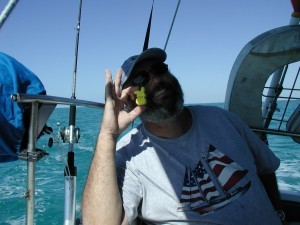
Share on Facebook
January 27, 2011
One small step for womankind, one hell of a leap for this sailor
Almost one year ago, my friend Mike Jastrzebski told me about the blog he wanted to start.
"I've got a great name," he said. "Write on the water. And the tag line is going to be So you want to quit your job, move onto a boat, and write."
And I remember thinking, Boy, do I! That's exactly what I want to do.
Then I read about and watched the rapid changes in the book world and heard of the democratization of publishing. And I've been reading about the Voluntary Simplicity Movement of people who are trying to determine their core values — people who don't want to keep working at careers they don't find fulfilling so they can fill their gas tanks, afford car insurance, or pay for wireless phones. They are willing to do with less so they can live close to nature and strive to fulfill their dreams. Meanwhile, day after day, week after week, I've lectured to my students and spoken to audiences of readers and I always tell them I am a risk taker.
Oh, really, Kling? You don't say. Prove it.
January 28, 2011
Dear Dr. _______:
I would like to inform you that I am retiring from my position with the College, effective July 1, 2011.
I have enjoyed working for the college, and I appreciate both the opportunity to serve the students and the unfailing support provided me throughout the time I have spent as a member of the faculty.
While I look forward to exploring new opportunities as a full-time writer and sailor, I will miss the students and my colleagues at the College. If I can be of any assistance during this transition, please let me know.
Fair winds,
Christine Kling
Share on Facebook
Drowning in Words- Today's guest post by Sharon Potts.
I'm not a sailor. I can barely swim. One of my first childhood memories was sitting by the steps of the swimming pool at Hochrat's Bungalow Colony (no, I'm not making up the name) in the New York Catskill Mountains. One moment, I was happily splashing the water, observing the bunions and differently shaped toes of the women who never ventured beyond the steps for fear of getting their hair wet. In the next instant, I was watching the world go upside-down and blurry, unable to breathe. One of the women lifted me out, shook me off, then put me back down on the step. I was two; it stayed with me.
That early experience wasn't auspicious for a life involving water. But somehow, I ended up living on a small island in Miami Beach, so I suppose one could say I do "write on the water." Though lately, as the release of my next thriller nears, I'm reminded of the sensation I experienced as a drowning two-year-old.
Let me back up. Writing is a new career for me. I started out as a CPA-corporate executive-entrepreneur. Then, about ten years ago, I sold my business and decided to pursue my passion. And no—contrary to what many people may think, including those who nicknamed me "Countess" for my propensity to count things, accounting was never my passion. So I began writing. Short stories first, then a full-length suspense novel. I wrote the entire book in three months, joined Mystery Writers of America, and started sending out queries to agents. I was on my way.
Since I was accustomed to succeeding from my previous career experiences, I was taken aback that no agents were interested in representing me. I wrote another book; another three months. It was also rejected. Reality set in. Maybe there was more to writing a book than simply putting seventy or eighty thousand words down on paper. I began studying the craft, learning about character development, pacing, setting, dialogue. I wrote several more books. But this time, my goal was to write a better book than my last one. Somewhere around book eight, Oceanview Publishing offered me a publishing contract. My first thriller, In Their Blood, came out in September 2009. It received a starred review from Publishers Weekly and won the Benjamin Franklin award for Mystery/Suspense. I no longer minded the nine years I'd invested.
It took over a year for me to get satisfied with my next thriller. Someone's Watching will be coming out on February 7—a year and four months after my debut. I expected the launch process to be the same, but I discovered that the world's once again gone upside-down and blurry on me. Publicity has turned digital. If you're not actively friending, tweeting, and blogging, no one's going to know about you. I checked my Facebook page and I have an embarrassingly low number of friends. LinkedIn—fagetaboutit—I'm barely a presence. No blogs, no tweets, no likes, I rarely make a comment on Facebook. What have I been doing?
Writing. Books. Focusing on the craft, trying to create memorable characters and plots that twist and turn. I want to write a great book, but who will read it?
I'm not a swimmer. I don't particularly like the water, but here I am living a few hundred feet from it. I suppose if I want readers to know my book's out there, I'll have to break down and friend and blog and tweet.
And yes, take up swimming. It's better than drowning.
Sharon Potts worked as a CPA, business executive, and entrepreneur before turning to a career of murder and becoming a crime fiction writer. Potts's Miami-based thrillers are about ordinary people in extraordinary situations. Her debut novel, In Their Blood, won top honors in the Mystery/Suspense category of the 2010 Benjamin Franklin Awards. Her latest thriller, Someone's Watching was called "shiver-rich" by Publishers Weekly, and "stunningly well-handled" by Booklist. She lives in Miami Beach and works on improving her craft as a writer in a critique group that includes Mike Jastrzebski and Christine Kling.
Visit her website, www.sharonpotts.com
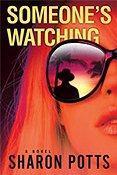
Share on Facebook
Drowning in Words- Todays guest post by Sharon Potts.
I'm not a sailor. I can barely swim. One of my first childhood memories was sitting by the steps of the swimming pool at Hochrat's Bungalow Colony (no, I'm not making up the name) in the New York Catskill Mountains. One moment, I was happily splashing the water, observing the bunions and differently shaped toes of the women who never ventured beyond the steps for fear of getting their hair wet. In the next instant, I was watching the world go upside-down and blurry, unable to breathe. One of the women lifted me out, shook me off, then put me back down on the step. I was two; it stayed with me.
That early experience wasn't auspicious for a life involving water. But somehow, I ended up living on a small island in Miami Beach, so I suppose one could say I do "write on the water." Though lately, as the release of my next thriller nears, I'm reminded of the sensation I experienced as a drowning two-year-old.
Let me back up. Writing is a new career for me. I started out as a CPA-corporate executive-entrepreneur. Then, about ten years ago, I sold my business and decided to pursue my passion. And no—contrary to what many people may think, including those who nicknamed me "Countess" for my propensity to count things, accounting was never my passion. So I began writing. Short stories first, then a full-length suspense novel. I wrote the entire book in three months, joined Mystery Writers of America, and started sending out queries to agents. I was on my way.
Since I was accustomed to succeeding from my previous career experiences, I was taken aback that no agents were interested in representing me. I wrote another book; another three months. It was also rejected. Reality set in. Maybe there was more to writing a book than simply putting seventy or eighty thousand words down on paper. I began studying the craft, learning about character development, pacing, setting, dialogue. I wrote several more books. But this time, my goal was to write a better book than my last one. Somewhere around book eight, Oceanview Publishing offered me a publishing contract. My first thriller, In Their Blood, came out in September 2009. It received a starred review from Publishers Weekly and won the Benjamin Franklin award for Mystery/Suspense. I no longer minded the nine years I'd invested.
It took over a year for me to get satisfied with my next thriller. Someone's Watching will be coming out on February 7—a year and four months after my debut. I expected the launch process to be the same, but I discovered that the world's once again gone upside-down and blurry on me. Publicity has turned digital. If you're not actively friending, tweeting, and blogging, no one's going to know about you. I checked my Facebook page and I have an embarrassingly low number of friends. LinkedIn—fagetaboutit—I'm barely a presence. No blogs, no tweets, no likes, I rarely make a comment on Facebook. What have I been doing?
Writing. Books. Focusing on the craft, trying to create memorable characters and plots that twist and turn. I want to write a great book, but who will read it?
I'm not a swimmer. I don't particularly like the water, but here I am living a few hundred feet from it. I suppose if I want readers to know my book's out there, I'll have to break down and friend and blog and tweet.
And yes, take up swimming. It's better than drowning.
Sharon Potts worked as a CPA, business executive, and entrepreneur before turning to a career of murder and becoming a crime fiction writer. Potts's Miami-based thrillers are about ordinary people in extraordinary situations. Her debut novel, In Their Blood, won top honors in the Mystery/Suspense category of the 2010 Benjamin Franklin Awards. Her latest thriller, Someone's Watching was called "shiver-rich" by Publishers Weekly, and "stunningly well-handled" by Booklist. She lives in Miami Beach and works on improving her craft as a writer in a critique group that includes Mike Jastrzebski and Christine Kling.
Visit her website, www.sharonpotts.com

Share on Facebook
January 26, 2011
I learned to sail because of the Good Humor Ice Cream truck.
Not the Snark, but two boats later, my catboat Myra Lee
I know, that's an odd statement, but trust me, it makes perfect sense.
I grew up in a powerboat family. We moved by way of diesel, not wind. But the family budget was limited, as was the depth at the docks, so when not cruising or off fishing we hung out in the mooring field surrounded by sailboats. No generator so no heat, no air conditioning, no TV, just lots and lots of books. In truth it was a wonderful way to spend the summers. I was quite happy passing the hours lounging on the forward deck reading as the boat gently rocked and sailboats glided past. All was good in the world…
Until I'd heard it. That sound. Every child knows that sound, the approach of the Good Humor truck. It's amazing just how well sound carries across the water, and in the right conditions I could hear that cheerful jingle coming down the riverside road for what seemed miles. My brother, being older, had rights to the dinghy and was usually down at the docks with his friends while I sat on the bridge desperately trying to wave him over for a lift to shore. To this day I'm certain he deliberately ignored my frantic signals, leaving me instead to suffer.
The solution to this problem was clear: I needed my own boat. But I'd seen the headaches that came from the miniature outboard on the dinghy; my parents and brother were forever doing battle with it. As I sat on the bridge listening to the sound of orange creamsicles receding into the distance I watched the sailboats gracefully coming and going and suddenly the solution seemed so very obvious. I wanted a sailboat. After all how hard could it really be? No gasoline, no fouled spark-plugs, no sputtering stink, just clean, simple, wind. I grabbed the copy of Chapman Piloting Seamanship & Small Boat Handling from the cabin, reading the 'Seamanship Under Sail' chapter over and over, memorizing every page and illustration. I studied the boats around us, watching them in action as they tacked and maneuvered through the various points of sail. And when my parents finally asked what I wanted for my birthday I announced "a sailboat." I half-expected they'd say 'No' but weeks later that's exactly what I got: my very own Snark. They had found it used and cheap; it was a bit scuffed up and the sail was bright orange, but I was thrilled beyond all reason.
All the theory and studying couldn't replace that first sail, which I insisted I would do solo. I climbed aboard, pulled in the sheet and there was a moment of sheer terror as the boat surged away from the dock, the only sound that of the water rushing around the Styrofoam hull. My brain scrambled to recall all I'd read. Did I turn into the wind, did I lean back, should I pull the tiller towards me or push it away? But within seconds all fear was forgotten as I felt the little boat building speed that seemed so swift and effortless as I skimmed over the waves. This was a thrill unlike anything I could have imagined. I felt the wind across my face and I began to remember all I'd read and the boat responded as I adjusted my heading. In the distance I could hear that ice cream truck jingling its way towards the boatyard. But what began as a means to an end had become the reward in itself. I had found something far greater than all the popsicles in the world – I had freedom, and the last thing I wanted to do was head that little boat back to shore.
[image error]
My crew, Moxy and Rex, awaiting shore leave.
I'm asking mystery readers to come together in raising money for a worthwhile cause — to benefit New Jersey's abandoned, abused and neglected animals. The New Jersey Society for the Prevention of Cruelty to Animals. (www.njspca.org), a non-profit organization, receives no government aid or tax dollars. It is funded solely by donations, grants, bequests and fines levied. My goal is to raise not only funds, but public awareness for the NJSPCA as they rescue animals from their abusers and make a difference in the lives of so many suffering animals. I've pledged that for every copy of Last Exit In New Jersey sold between 12/1/10 and 01/31/11, $1.00 will be donated to the NJSPCA. For more information go to www.cegrundler.com/works.htm and donations can also be made directly to the NJSPCA through their website: www.njspca.org
Share on Facebook
January 24, 2011
Water Moves, Me
by Tom Tripp
I'm in Bath, Maine, this week on a business trip and last night before I went out to dinner I spent several minutes watching the thick ice floes slide inexorably down the Kennebec River in front of my hotel. With the temperature hovering around 0 degrees F, there is a lot of ice. The river here is wide and strong, with tidal currents that amplify the movement with the powerful, unseen hand of sun and moon. I turn away to take a phone call, then return to my window and still the icy river runs.
The sea pulls the Kennebec toward it whether I am watching or not and the Kennebec, in its Taoist water way, surpasses every obstacle — a jutting pier, a rocky headland, a bridge abutment. It is yielding and yet dogged. It will reach the sea. The ice it carries today will also reach the sea, after splitting, colliding, overriding, piling, twisting and spinning.
The sea is itself incessant movement. Even on a breathless day, the ebb and flow quietly draw and lift the endless tons of salt water. When the Arctic winds roar out of the northwest, an endless cavalry of snow-maned steeds pound the beach, effortlessly shifting the border between Earth and Ocean.
This water on which, and about which I so often write is never still. If my mind lingers too long on a dry stretch I have only to turn to the water to move again.
Share on Facebook
January 23, 2011
When did our dock lines become chains?
By Mike Jastrzebski
Mary and I moved aboard Rough Draft on September 2, 2003 with the intention of taking the boat from Minnesota to someplace where palm trees grew. We spent two months in the Lake City Marina on the Mississippi River getting the boat ready to go. We left Lake City and sailed (motored really) down the Mississippi to the Ohio River, up to the Tennessee-Tombigbee waterway and down to Mobile, Alabama where we spent nearly two years. It took a hurricane to get us off the docks in Mobile.
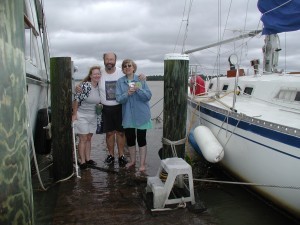
After that we spent 3 months in the city mooring field in Key West.
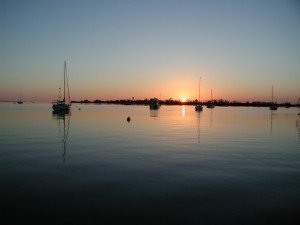
And now we've been docked for nearly five years behind an apartment building in Ft. Lauderdale.
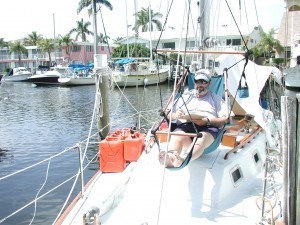
There-in lies the problem. We knew we had to work until 2011 when we started this trip, but we never expected to spend this much time in one location. You see, we don't take the boat out while living aboard. It's just too much like work and not enough like fun. It takes hours to secure everything on board, disconnect from shore power, and toss off the lines. Then its forty-five minutes to get out to the ocean. After a three or four hour sail we have to go through it all in reverse, so we save our sailing for bouts of moving from one location to another.
We're planning on moving out in a couple of months now, but we're finding it a little difficult. We're making excuses to stay even though neither of us likes it here.
We talk about how much more money we could save if we stayed another year. That's true, but we'd be even better off if we stayed here five more years. Neither of us wants that.
We talk about how well my books are selling and that if we stay I could write another book in a year. Of course, I can write anywhere. At anchor. At some other marina.
So why are we still here? It's those damn chains. I think it's time to get out the hacksaw and get to work on those chains. It's time to get this boat moving again.
Any of you out there reading this feel like you've been where you are for too long? What are you doing about it?
Share on Facebook
January 20, 2011
Mid-passage thoughts from a writers' conference
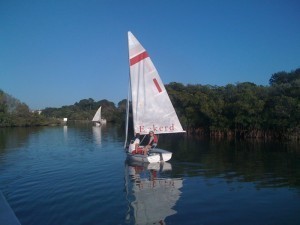
Eckerd College sailing dinghies ghosting home
Words, words and more words. I am drowning in words.
It is 1:45 a.m. and I'd just finished editing the two pieces for tomorrow's workshop when I remembered I am supposed to post a blog.
Oh s&$%t. More words.
It's tough being a student again here at Eckerd College's Writers in Paradise. But this is what I wanted, what I asked for, and I am reveling in the experience – I think. Is that the right word? I need a GPS to find the right word these days.
This is a week-long conference and every day we have three hours of lecture and three hours of workshop. We are 11 in my group and we are workshopping the Middle of the Novel. We all submitted a 5 page single-spaced synopsis and 25 manuscript pages, so we must read and critique 60 pages per day. Today was my day in the hot seat. My marked-up manuscripts are delicious delectables that I'll savor slowly when I get home — because I don't have time to look at them now. I have to read every night to prep for the next day.
Words, words, words. I'm in the doldrums at the moment. Surrounded by words, words, everywhere and not a drop to drink.
From my notes . . .
Dennis Lehane — In terms of the characters in a novel — getting what one wants is part of the journey, but getting what one needs is the journey. Once you've told the story, get off the page. Context and specificity are everything.
Laura Lippman showed how she uses different color cards to show the different points of view in a novel and she needs to see what her book looks like.
Sterling Watson — A good writer controls the reader's expectations so that the payoff is something better than what the reader expected.
Michael Koyta — Suspense = an emotional state, i.e. anxiety, a feeling of uncertainty about what will happen next. If your readers don't feel an emotional investment, you don't stand a chance. Caring can't be faked.
Quote from Alfred Hitchcock, "There is no terror in the bang, only in the expectation of it."
I learn as much about my own work from the experience of critiquing the work of others. We all make the same mistakes. Once I see it in their books, I'm better able to fix it in mine. I'm sharpening my machete and when I go home, I'm going to become Jane of the Jungle and go in and start cutting. My book has become overgrown. I need to let in a little light.
Tomorrow is the publishing panel. We'll see what they say. I'm waiting for the end to make up my mind as to whether I seek print or go directly to ebook. I'm still on the bubble on that one.
I'll keep you posted.
Fair winds,
Christine
Share on Facebook
Is a book just one really long blog post?
By Richard Jordan
Inspired by recent posts by Christine, Mike, John, Michael, Victoria about the changing world of book publishing, I have been thinking about how I fit in with this world. I have never written a book and have no plans to. I write online articles; I write a company blog. But how does online writing, namely "blogging," differ from offline writing like "book writing?" The difference is not that clear anymore. With the Amazon Kindle and self-publishing, the difference is not simply a technological thing. Can you twist these two forms of writing such that they look the same? Are these two spaces in a spectrum? Or are there unbreakable barriers that divide blogging and book writing such that you can say "this is a blog; that is a book?" I will in this post lay out what I perceive as four common differences and blur them. Please feel free to define what you think is the difference in the comment section below.
Difference 1: Books are published in one chunk; blogs are written piece wise.
Charles Dickens used to write and publish his books piece by piece. Chapters were published periodically, sequentially. And Charles would even modify his storyline depending on how popular the periodicals were. He could tell how many people were following his story. If it was not going as well as he thought, he took the story in a different direction or weaved in a hot topic. Was Dickens blogging?
If a blogger wrote his posts privately, published them all on one day, and then never edited them or added another post, would that blog be a book?
Difference 2: Books are purchased; blogs monetize via supplementary advertising.
What if Amazon's Kindle allocated space for banner ads on the screen? Would a book read in this format be a blog?
If a blog charged a one-time fee like the Wall Street Journal does for readers to access their content, would that revenue model make the blog a book?
Difference 3: Books start at the beginning; blogs start at the end.
Kurt Vonnegut used to say that with a good book you can open any page randomly and start reading. He tried to prove this by mixing up the order of action in his books. Would a book with the chapters in reverse order be a blog?
Some unconventional blogs start with the first post. Any blog could conceptually do so. Are such blogs then books?
Difference 4: Books contain static content; blog content is dynamic.
Books come out in new editions with changes and additions. For instance, the Bible has evolved over the years both via sections getting rewritten with such as King James' version and additional sections being added such as the New Testament. Could we consider the Bible a blog and the various prophets (Moses, Luke, etc.) guest bloggers?
Some bloggers never look back. For instance here on Write on the Water, these posts are never re-edited. Someday Write on the Water may end. At that point no new posts will be added and none of these previous posts will be edited. Will WOW then be a book?
Conclusion
The recent posts here have made me think of self-publishing selected articles from my blog as a book available on Amazon Kindle. I could skim off my best yacht reviews and flash freeze them into a book for publication. Maybe it would be another way to attract readership to my blog. I speculate that some day books and blogs will be indistinguishable. Do people read blogs like books? I have not tried, but maybe I should. I think Charles Dickens and Kurt Vonnegut would be experimenting with blogging if they were young and striving. Maybe we should republish old books in blog form? What do you think is the main difference between a blog and a book? Is there one?
Share on Facebook



